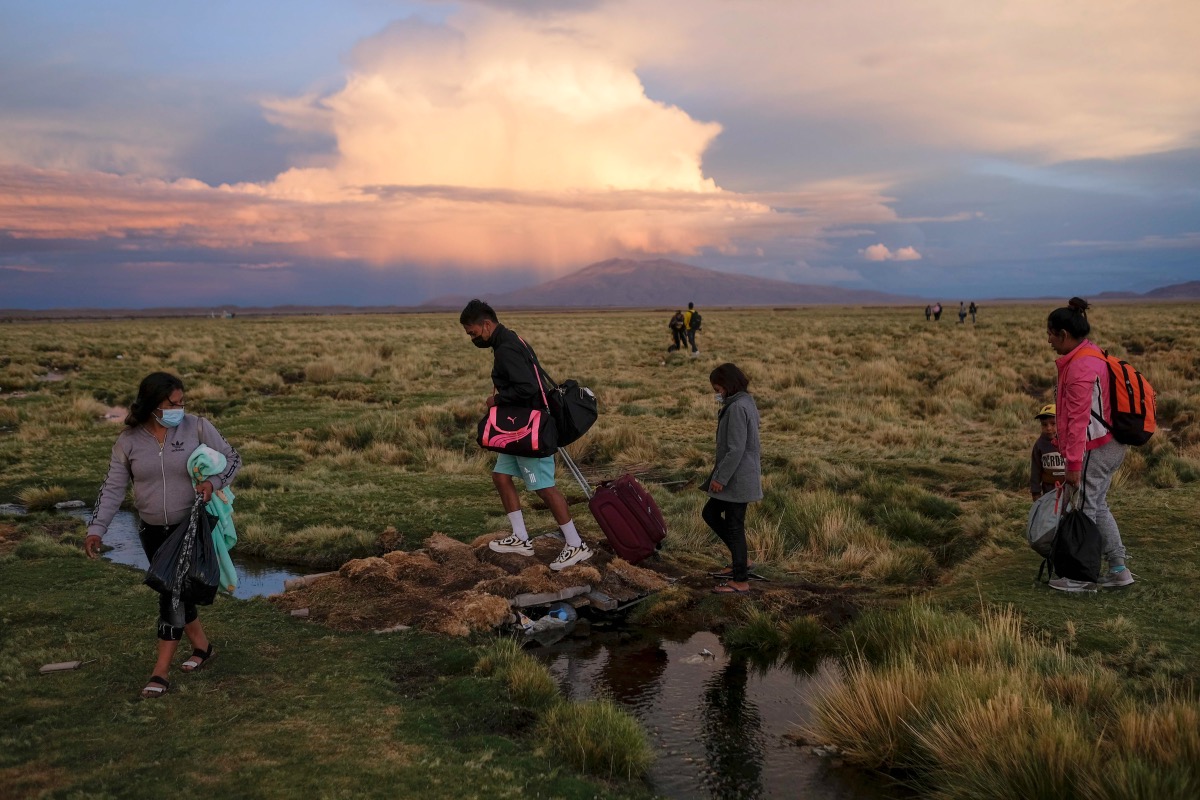

Migrants walk on the field after crossing into Chile from the Bolivian border near Colchane, Chile, Thursday, December 9, 2021. (AP Photo/Matias Delacroix)
By MATÍAS DELACROIX and PATRICIA LUNA, Associated Press
COLCHANE, Chile (AP) — A merciless sun seared the migrants as they walked through one of the driest places in the world, trying to illegally cross the border from Bolivia into Chile fearing it might soon be closed.
It has become common in recent months to see migrants trudging across the Atacama Desert, but the flow appears to have increased in recent days ahead of Chile’s presidential runoff Sunday. The migrants fear that if far-right candidate José Antonio Kast wins he will close the border as he promised during his campaign.
The conservative lawmaker, who has defended Chile’s military dictatorship, finished first in the country’s presidential election in November but did not get enough votes to win outright, setting up a runoff against leftist Gabriel Boric. Kast has said he will order a ditch to be built to prevent migrants from crossing from Bolivia.
Immigration has been a recurring topic in Chile’s presidential campaign as the country sees an increasing flow of migrants, mainly from Venezuela, but also from nations like Haiti and Colombia. It’s a divisive issue and recently there was a widely publicized case of Chileans attacking Venezuelan migrants in Iquique, near the border with Bolivia and Peru.
The U.N. International Organization for Migration estimates there are almost 1.7 million immigrants in Chile. Only this year, Chilean authorities have registered more than 25,000 people arriving through the Atacama Desert, a significant increase compared to the 16,500 for all 2020.
“We have relatives here in Chile who told us that we had to go before December 19, because if the one who won the first round (Kast) wins again, he will close all borders,” said Rayber Rodríguez, a Venezuelan traveling with his wife and daughter.
Tatiana Castro, a Colombian who also crossed into Chile through the desert, put it bluntly. “We had to cross right now for fear that they would send us back.”
She said people “do not know how hard it is, that we have to go through many countries and across many borders where it is hard for us, we have to endure hunger … cold weather.”
The border has been guarded for months by the police and the army, though migrants cross using different paths in the desert in plain sight. The border area was empty until a few years ago. Now it looks like the transit area of a train terminal.
Once in Chilean territory, migrants are not detained. Some keep walking to the closest city while others turn themselves in to authorities so they can start a process that might help them to regularize their immigration status.
Colchane, a Chilean town near the border with fewer than 1,600 inhabitants, mostly Indigenous Aymara, has seen a constant flow of migrants in recent months. Sometimes the migrants outnumber the local population.
“We can’t take it anymore,” said Nicolás Mamani Gómez, who wants Kast to win, so “no more immigrants will come.”
Some of the migrants walk further after crossing the border and make it to the city of Iquique.
There, some of the migrants have been living in public parks and beaches. And not all the residents are happy. A few weeks ago, some locals attacked a camp where Venezuelans were staying and burned their belongings.
Virginia Carrasco, a 30-year-old Venezuelan, crossed the desert and entered into Chile with her three children —11, 8, and a baby of six months— looking for a better life.
Carrasco said she wants a better healthcare system for them.
“In Venezuela’s hospitals you get nothing,” she said, as she dragged a cart filled with suitcases, bags, and backpacks. “There are people who have died because they cannot get medicine or doctors. I expect a better quality of life for my children in Chile, that’s why I came here.”
____
Luna reported from Santiago, Chile.


